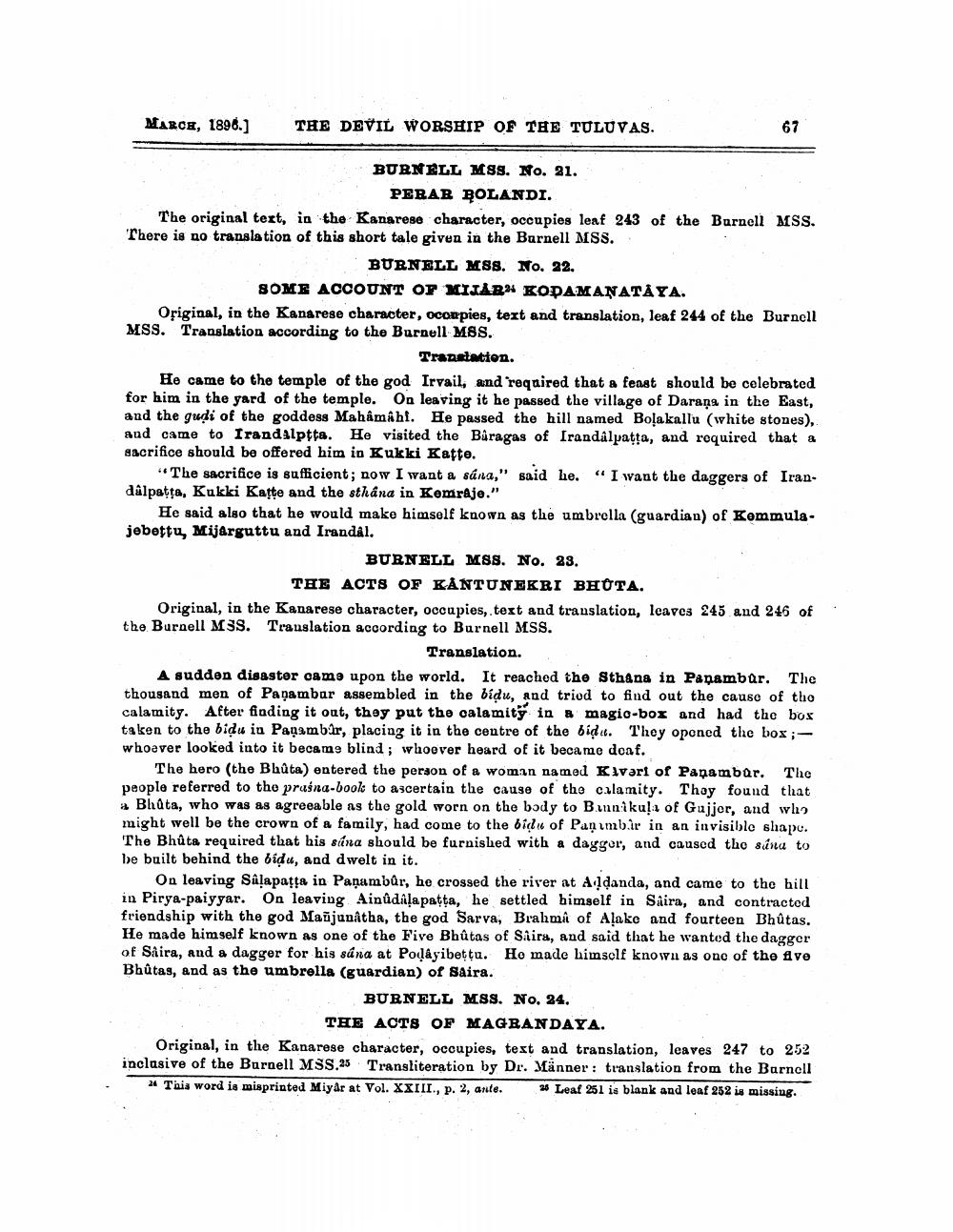________________
MARCE, 1896.]
THE DEVIL WORSHIP OF THE TULUVAS.
BURNELL MSS. No. 21.
PERAR BOLANDI. The original tert, in the Kanarese character, occupies leaf 243 of the Barnell MSS. There is no translation of this short tale given in the Burnell MSS.
BURNELL M88. No. 22. SOME ACCOUNT OF MIJAR# KODAMANATÁYA. Original, in the Kanarese character, ocorpies, text and translation, leaf 244 of the Burnell MSS. Translation according to the Burnell MSS.
Translation. He came to the temple of the god Irvail, and required that a fennt should be celebrated for him in the yard of the temple. On leaving it he passed the village of Darana in the East, and the gudi of the goddess Mahamahi. He passed the hill named Boļakallu (white stones), and came to Irandulptta. He visited the Baragas of Irandalpatta, and required that & sacrifice should be offered him in Kukki Katte.
"The sacrifice is sufficient; now I want a sana," said he. “I want the daggers of Irandůlpatta, Kukki Katte and the sthana in Kemraje."
He said also that he would make himself known as the umbrella (guardian) of Kommula. jebettu, Mijarguttu and Irandal.
BURNELL MSS. No. 23.
THE ACTS OF KÅNTUNEKRI BHUTA. Original, in the Kanarese character, occupies, text and translation, leaves 245 and 246 of the Burnell M3s. Translation according to Burnell MSS.
Translation. A sudden disaster came upon the world. It reached the Sthana in Panambur. The thousand men of Panambar assembled in the bidu, and triod to find out the cause of tho calamity. After finding it out, they put the calamity in a magio-box and had the box taken to the bidu ia Pagambar, placing it in the centre of the bid. They opened the box ;whoever looked into it became blind; whoever heard of it became doaf.
The hero (the Bhuta) entered the person of a woman named Kivart of Panambar. The people referred to the praśna-book to ascertain the cause of the calamity. Thay found that a Bhūta, who was as agreeable as the gold worn on the body to Bunnikula of Gujjer, and whe might well be the crown of a family, had come to the bids of Paņımbaar in an invisible shape. The Bhúta required that his sina should be furnished with a dagger, and caused the sina to be built behind the bidu, and dwelt in it.
On leaving Salapatta in Panambůr, he crossed the river at Aldanda, and came to the hill in Pirya-paiyyar. On leaving Ainûdala patta, he settled himself in Saira, and contracted friendship with the god Mañjunatha, the god Sarva, Brahma of Alake and fourteen Bhůtas. He made himself known as one of the Five Bhutas of Siirs, and said that he wanted the dagger of Saira, and a dagger for his sána at Podãyibettu. Ho made himself known as one of the Alve Bhůtas, and as the umbrella (guardian) of Saira.
BURNELL MSS. No. 24.
THE ACTS OF MAGRANDAYA. Original, in the Kanarese character, occupies, text and translation, leaves 247 to 252 inclusive of the Burnell MSS.25 Transliteration by Dr. Månner: translation from the Burnell
21 This word is misprinted Miyår at Vol. XXIII., p. 2, ante. Leaf 251 is blank and leaf 252 is missing.




